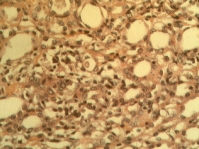Effects of Oral Administration of Aloe Vera Plus on the Heart and Kidney: A Subacute Toxicity Study in Rat Models
Main Article Content
Abstract
Background: Aloe vera gel is one of several nutritional supplements gaining widespread popularity in Nigeria and many other countries of the world. Adverse effects of ingestion of low doses of Aloe vera are seldom reported. It has however, been associated with diarrhea, electrolyte imbalance, kidney dysfunction, and hepatitis. The aim of this study is to investigate the effects of oral administration of GLND'S Aloe vera Plus on the kidneys and hearts of rats.
Methods: 80 apparently healthy, adult Wistar albino rats were divided into five groups, three of which were given three different doses of Aloe vera plus twice a day for 14, 28 and 42 days. The 4th group served as controls while the 5th was given Aloe vera plus for 28 days, following which the drug was withdrawn for another 28 days. The animals were sacrificed at the end of the experiment and the hearts and kidneys harvested for histopathological analysis.
Results: The results indicate that Aloe vera plus caused nephrotoxic changes, including chronic inflammatory cell infiltration, hyalinization, thickening of renal capillaries, tubular collapse and necrosis, and glomerular and interstitial fibrosis. It also caused cardiotoxic effects but not in a significant number of rats.
Conclusion: The nephrotoxic effects of aloe vera occurred more in the dose range recommended by the manufacturers and least with the highest dose and longest duration of treatment. We recommend that this nutritional supplement be subjected to the same regulatory standards as pharmacotherapeutic agents
Downloads
Article Details
Section

This work is licensed under a Creative Commons Attribution-NonCommercial-NoDerivatives 4.0 International License.
The Journal is owned, published and copyrighted by the Nigerian Medical Association, River state Branch. The copyright of papers published are vested in the journal and the publisher. In line with our open access policy and the Creative Commons Attribution License policy authors are allowed to share their work with an acknowledgement of the work's authorship and initial publication in this journal.
This is an open access journal which means that all content is freely available without charge to the user or his/her institution. Users are allowed to read, download, copy, distribute, print, search, or link to the full texts of the articles in this journal without asking prior permission from the publisher or the author.
The use of general descriptive names, trade names, trademarks, and so forth in this publication, even if not specifically identified, does not imply that these names are not protected by the relevant laws and regulations. While the advice and information in this journal are believed to be true and accurate on the date of its going to press, neither the authors, the editors, nor the publisher can accept any legal responsibility for any errors or omissions that may be made. The publisher makes no warranty, express or implied, with respect to the material contained herein.
TNHJ also supports open access archiving of articles published in the journal after three months of publication. Authors are permitted and encouraged to post their work online (e.g, in institutional repositories or on their website) within the stated period, as it can lead to productive exchanges, as well as earlier and greater citation of published work (See The Effect of Open Access). All requests for permission for open access archiving outside this period should be sent to the editor via email to editor@tnhjph.com.
How to Cite
References
Satish S, Raveesha KA, Janardhana GR. Antibacterial activity of plant extracts on phytopathogenic xanthomonas campestris pathovars. Lett Appl Microbiol, 1999; 28 (2): 145-147.
Boudreau MD, Beland FA . An evaluation of the biological and toxicological properties ofAloe barbadensis miller (Aloe vera”). J Environ Sci Health C Environ Carcinog Ecotoxicol Rev, 2006; 24 (1): 103-154.
Kahlon J, kemp MCX, Yawei N, Carpenter RH, McAnalley HR, Shannon WM, McDaniel BH. An evaluation of the synergistic antiviral effects ofacemannan in combination with azidothymidine and acyclovir. Mol Biother, 1991; 3:214-223.
Hu Q, Hu Y, Xu J. Free radical-scavenging activity ofAloe vera (Aloe barbadensis Miller) extracts by supercritical carbon dioxide extraction. Food Chemistry, 2005; 91, 85-90.
Rajasekaran SK, Sivagnanam K and Subramanian S. Antioxidant effect of Aloe vera gel extract in streptozotocin-induced diabetes in rats. Pharmacol. Rep, 57:90-96.
Bezakova L, Oblozinsky M, Sykorova M, Paulikova I and Kostalova D. Antilipoxygenase activity and the trace elements content of Aloe vera in relation to the therapeutical effect. Ceska Slov Farm, 2005; 54(1): 43-46.
Rajasekaran SK, Sivagnanam K and Subramanian S. Modulatory effects of aloe vera leaf gel extract on oxidative stress in rats treated with streptozotocin. J Pharm Pharmacol, 2005; 57: 241-246.
Ernst E. Adverse effects of herbal drugs in dermatology. BJD, 2000; 143 (5): 923-9.
Rabe C, Musch A, Schirmacher P, Kruis W, and Hoffmann R. Acute hepatitis induced by an aloe vera preparation: a case report. World J Gastroenterol, 2005; 11(2): 303-304
Vinson JA, Al Kharrat H and Andreoli L. Effect of Aloe vera preparations on the human bioavailability ofvitamins C and E. Phytomedicine, 2005; 12(10): 760-765.
Zhang XF. Isolation, structure elucidation, antioxidative and immunomodulatory properties of two novel dihydrocoumarins from Aloe vera. Bioorg Med Chem Lett, 2006; 16(4): 949-953.
Wu JH, Xu C, Shan CY and Tan RX. Antioxidant properties and PC12 cell protective effects of APS-1, a polysaccharide from Aloe vera var clinensis. Life Sci 2006; 78(6): 622-630.
Rajasekaran S, Sivagnanam S, Ravi K and Subramanian S. Beneficial effects of aloe vera leaf gel extract on lipid profile status in rats with streptozotocin diabetes
Sirdaata J and Clark IE. Effect of Aloe barbadensis Miller juice on oxidative stress biomarkers in aerobic cells using artenia franciscana as a model. Phytotherapy Research, 2010; 24(3): 360-364

